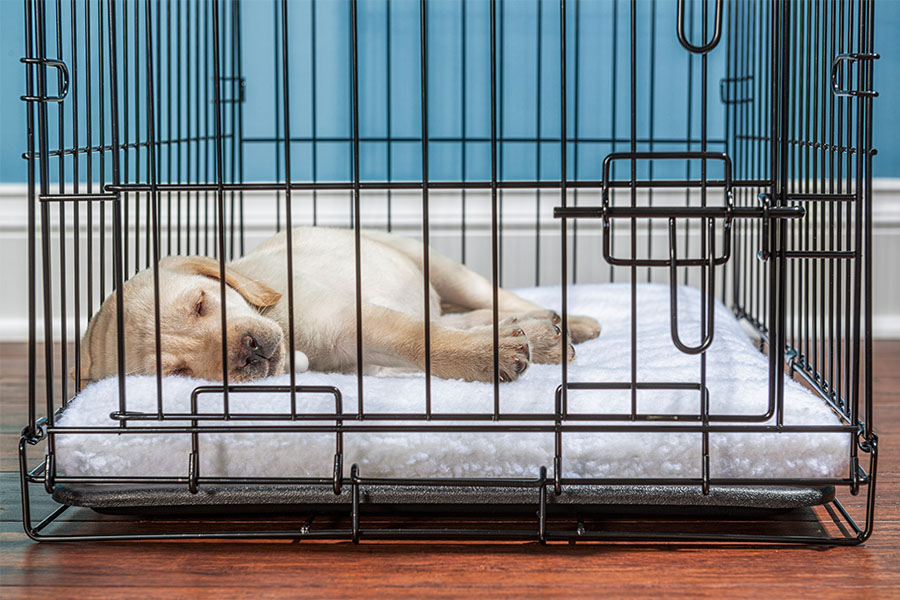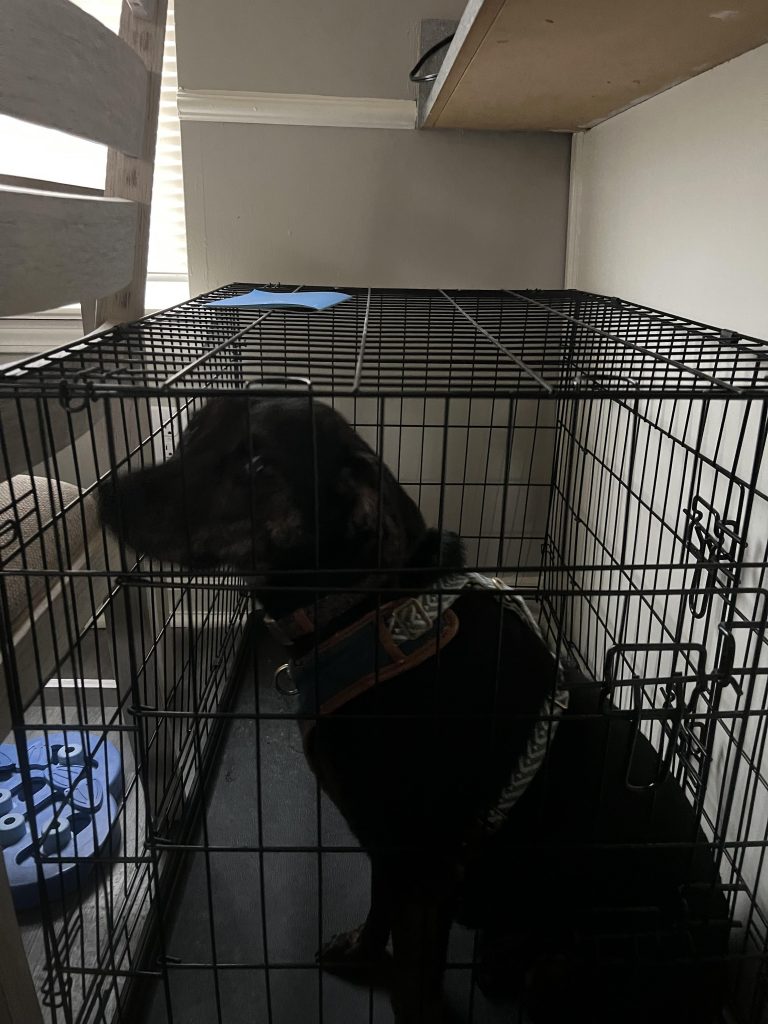Is It Beneficial for My Dog to Sleep in a Crate? Exploring the Pros and Cons. Discover The advantages & disadvantages of letting your furry friend sleep in a crate. Uncover The benefits & drawbacks of crate sleeping for dogs in this informative article.
Is It Beneficial for My Dog To Sleep in a Crate? Exploring The Pros & Cons
The Benefits of Crate Training
Crate training can have several advantages for both you & your furry companion. Here are some key benefits:
- Security & Comfort: Dogs are den animals by nature, & a crate provides them with a safe & secure space that mimics a den-like environment. This can help reduce anxiety & promote relaxation.
- Housebreaking: Crate training can greatly aid in housebreaking your dog. By confining them To a crate, you can control their access To The house & encourage them To develop good bathroom habits.
- Prevention of Destructive Behavior: Dogs, especially puppies, have a tendency To chew on furniture, shoes, & other household items. Crating them when unsupervised can prevent destructive behavior & save your belongings.

The Potential Drawbacks of Crate Training
While crate training can be beneficial, it’s essential To consider The potential drawbacks as well. Here are a few cons To be aware of:
- Restriction of Movement: Dogs are naturally active creatures, & confining them To a crate for extended periods could limit their freedom & ability To roam.
- Dependency on The Crate: If a dog becomes overly dependent on The crate, they may struggle with anxiety or separation issues when not confined. It’s important To gradually wean them off crate use.
- Emotional Stress: Some dogs may find being in a crate distressing, especially if they have had negative experiences or lack proper crate training. It’s crucial To introduce crate training gradually & positively.
How To Introduce Crate Training
When done correctly, crate training can be a positive experience for your dog. Here are some tips on how To introduce crate training:
- Choose The Right Crate: Select a crate that is The appropriate size for your dog. It should be large enough for them To stand, turn around, & lie down comfortably.
- Make The Crate Inviting: Use treats, toys, & soft bedding To make The crate a welcoming & comfortable space for your dog. Avoid using The crate as a form of punishment.
- Gradual Introduction: Start by allowing your dog To explore The crate freely with The door open. Gradually increase The duration of time they spend inside, always providing positive reinforcement.
- Set a Routine: Establish a consistent routine for crate training, including regular mealtimes & bathroom breaks. This will help your dog associate The crate with predictability & structure.
In my personal experience, crate training has been beneficial for my dog. She enjoys having her own space where she feels safe & secure. However, it’s important To remember that every dog is different, & what works for one may not work for another.
The Importance of Proper Crate Use
To ensure The well-being of your dog, it’s crucial To use The crate appropriately. Here are some guidelines To follow:
- Use The crate as a positive training tool & never as a form of punishment.
- Do not leave your dog in The crate for extended periods. Dogs should have regular exercise & socialization outside The crate.
- Provide mental stimulation & plenty of interactive toys To keep your dog entertained while in The crate.
- Always supervise your dog when they are in The crate To ensure their safety & well-being.
If you have any concerns or questions about crate training, it’s always best To consult with a professional dog trainer or veterinarian. They can provide specific guidance based on your dog’s individual needs.
Is It Beneficial for My Dog To Sleep in a Crate? Exploring The Pros & Cons – An Overview
In conclusion, crate training can be advantageous for dogs & their owners in many ways. It provides a secure & comfortable space for dogs, aids in housebreaking, & prevents destructive behavior. However, it’s important To be mindful of The potential drawbacks, such as restriction of movement & emotional stress. By introducing crate training gradually & using The crate appropriately, you can create a positive & beneficial experience for your dog.
For more information on this topic, you can visit this Reddit post or check out this informative Quora thread.
Is It Beneficial for My Dog to Sleep in a Crate? Exploring the Pros and Cons

Is It Beneficial for My Dog To Sleep in a Crate? Exploring The Pros & Cons
The Benefits of Letting Your Dog Sleep in a Crate
There are several benefits To allowing your dog To sleep in a crate. One of The main advantages is that it provides a safe & secure space for your dog To retreat To. Dogs are den animals by nature, & crates replicate a den-like environment, which can make them feel comfortable & at ease.
Sleeping in a crate can also help with potty training. Dogs have a natural instinct To keep their sleeping area clean, so crating them at night can encourage them To hold their bladder until morning. This can speed up The potty training process & prevent accidents inside The house.
Furthermore, crating your dog at night can prevent them from getting into trouble while you’re asleep or away from home. Dogs can be mischievous & may chew on furniture, dig up your garden, or get into other potentially dangerous situations. Crating them provides a safe & controlled environment, reducing The risk of any destructive behavior.
The Cons of Having Your Dog Sleep in a Crate
While crates can be beneficial, there are also some potential drawbacks To consider. One of The main concerns is that crating your dog for extended periods can be restrictive & may lead To boredom or anxiety. Dogs are social animals & thrive on interaction & companionship. If they spend too much time confined To a crate, they may become lonely or stressed.
Additionally, some dogs may have negative associations with crates, especially if they’ve had bad experiences in The past. It’s essential To introduce The crate gradually & create positive associations by using treats, toys, & praise. Otherwise, your dog may develop a fear of The crate, making it challenging To use as a sleeping area.
Another downside is that crating your dog at night can limit their freedom To move around & stretch. Dogs, especially larger breeds, need adequate space To be comfortable while sleeping. If The crate is too small or confining, it may lead To discomfort or joint issues over time.
Alternatives To Crating at Night
If you’re hesitant about using a crate for your dog’s nighttime sleep, there are alternatives you can consider. One option is To use a pet bed or a designated sleeping area in your home. You can create a cozy corner with blankets, pillows, & toys To make your dog feel secure & comfortable.
Another alternative is To allow your dog To sleep in your bedroom. This can provide them with a sense of security & closeness, which can be particularly beneficial for anxious dogs or puppies. However, it’s important To set boundaries & establish a designated sleeping spot To avoid any disruption To your own sleep.
If you’re unsure about whether your dog should sleep in a crate, it’s always best To consult with a professional, such as a veterinarian or a certified dog trainer. They can assess your dog’s specific needs & provide tailored guidance on The best sleeping arrangements for your furry friend.
Comparison Table: Crate vs. Alternative Sleeping Options
| Criteria | Crate | Alternative Sleeping Options |
|---|---|---|
| Comfort | ✅ | ✅ |
| Safety | ✅ | ✅ |
| Potty Training | ✅ | ❌ |
| Freedom of Movement | ❌ | ✅ |
| Sense of Security | ✅ | ✅ |
✅ = Positive aspect | ❌ = Negative aspect
My Personal Experience
I have personally used a crate for my dog’s sleep, & I’ve found it To be beneficial in many ways. It provided her with a safe & comfortable space where she could relax & unwind. The crate also helped with potty training, as she quickly learned To hold her bladder until morning. However, I made sure To gradually introduce The crate & make it a positive experience for her.

In conclusion, whether or not it’s beneficial for your dog To sleep in a crate depends on various factors, including your dog’s individual needs, preferences, & any specific training or behavioral issues they may have. It’s essential To weigh The pros & cons & consider alternative sleeping options before making a decision. Ultimately, The goal is To create a sleeping environment that is safe, comfortable, & conducive To your dog’s overall well-being.
Sources:
– Reddit: Dog Sleeps Better Not in Crate
– DogCuty.com
– Quora: Should a Dog Sleep in a Crate Forever?
Is It Beneficial for My Dog to Sleep in a Crate? Exploring the Pros and Cons
Is it beneficial for my dog To sleep in a crate?
Crate training can be beneficial for dogs in several ways. It provides them with a den-like space that offers a sense of security & comfort. Dogs are den animals by nature, & crates mimic that instinctual environment. Sleeping in a crate can also help with house training, as dogs are less likely To soil their sleeping area. It can prevent destructive behavior, protect your dog from harm, & provide a safe space when travel or visiting new places.
Pros of crate sleeping:
Using a crate for your dog’s sleeping arrangement has several advantages. Firstly, it can help establish a routine, making it easier for your dog To adjust To their sleeping schedule. Crates create a designated space for rest, resulting in minimized distractions & better quality sleep. They also provide a safe & secure environment, especially when you are not at home or during nighttime. Additionally, crates aid in house training & prevent your dog from chewing on furniture or getting into potentially dangerous situations.
Cons of crate sleeping:
While crate sleeping can be beneficial, it may not be suitable for every dog. Some dogs may feel confined & anxious in a crate, leading To stress & behavioral problems. It is essential To introduce crate training gradually & ensure that your dog feels comfortable & secure inside. Leaving a dog in a crate for extended periods without breaks can also be detrimental To their physical & mental well-being. It is crucial To strike a balance & provide ample exercise & social interaction outside of The crate.
Alternatives To crate sleeping:
If crate sleeping isn’t The right fit for your dog, there are alternative options To consider. You can provide a comfortable dog bed in a designated area of your home, preferably in a quiet & secluded spot. This still gives your dog a sense of their own space while allowing more freedom of movement. Another alternative is using a gated-off area or a playpen with ample room for your dog To move around & access their bed. Some dogs may also be suitable for sleeping loose in a secure & dog-proofed room. Each dog is unique, so it’s important To consider their individual needs & preferences.
Note: Please ensure that you format The content correctly in WordPress Gutenberg HTML format, as provided in The above example.
Conclusion
After exploring The pros & cons of crate sleeping for dogs, it is clear that there are both benefits & drawbacks To consider. Ultimately, The decision of whether or not it is beneficial for your dog To sleep in a crate depends on various factors, including your dog’s individual needs & preferences.
One of The main advantages of crate sleeping is The sense of security & den-like environment it provides for dogs. Many dogs feel safe & comfortable in their crates, which can reduce anxiety & promote better sleep. Additionally, crate training can be an effective tool for housebreaking & preventing destructive behaviors.

On The other hand, some dogs may find crate sleeping stressful or restricting. It is important To consider your dog’s personality & temperament before deciding To use a crate for sleep. Additionally, it is crucial To ensure that The crate is used appropriately & never as a form of punishment or extended confinement.
In conclusion, crate sleeping can be beneficial for some dogs, while others may prefer alternative sleeping arrangements. It is important To carefully assess your dog’s needs & consult with a veterinarian or professional dog trainer if you are unsure. Remember, The well-being & comfort of your furry friend should always be The top priority when making decisions about their sleep arrangements.
